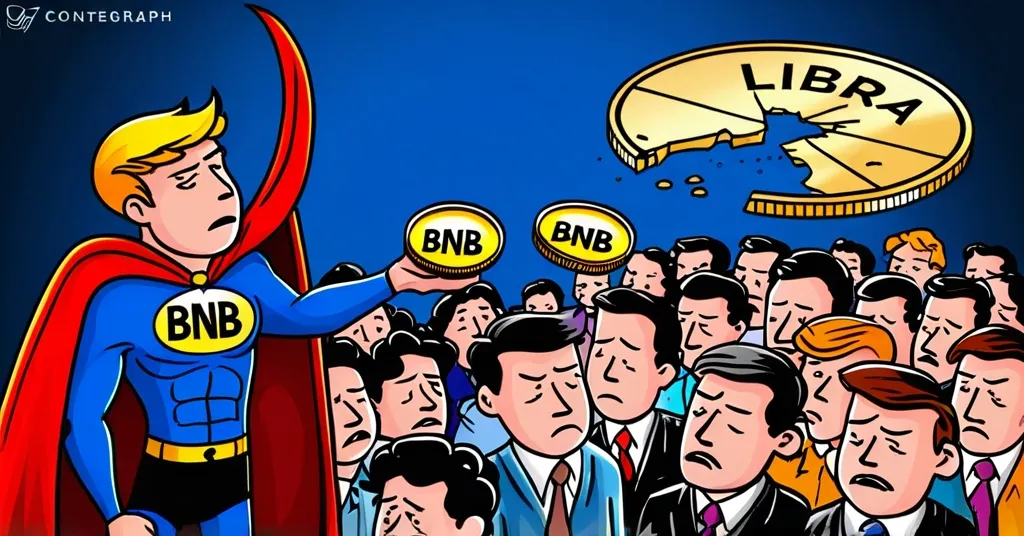CZ Donates $100K in BNB to Aid LIBRA Memecoin Scam Victims

Binance Founder CZ Commits $100,000 to Aid LIBRA Memecoin Scam Victims
In the aftermath of the devastating LIBRA memecoin scam, which left over 40,000 investors with losses totaling $4.4 billion, Changpeng Zhao (CZ), the founder of Binance, has stepped up with a donation of 150 BNB, valued at around $100,000, to help the victims. This move was inspired by EnHeng, a college student who initiated the relief effort with a $50,000 donation and a fundraising address on the Binance Smart Chain (BSC).
- CZ donates 150 BNB to LIBRA scam victims
- EnHeng’s $50,000 donation sparks relief effort
- LIBRA scam results in $4.4 billion in losses
- President Milei faces fraud accusations and impeachment calls
The LIBRA Memecoin Scam
The LIBRA memecoin’s value skyrocketed from $0.22 to over $5 following an endorsement by Argentine President Javier Milei. However, the coin crashed by 70% within an hour when early investors sold off their holdings, a move often referred to as a “rug pull,” where developers abandon a project and run away with investors’ money. This sudden increase and drop left many investors in financial ruin, highlighting the volatile nature of memecoins and the dangers of market manipulation.
The LIBRA scam, which was tied to Milei’s Project Libertad initiative aimed at supporting Argentine businesses, drew attention to the broader implications of political endorsements in the cryptocurrency space. When Milei withdrew his support by deleting his endorsement on X (formerly Twitter), the fallout was immediate and severe.
Community Response
CZ’s donation is a testament to the strong sense of community within the cryptocurrency world. Known for his support of the crypto community, CZ amplified EnHeng’s efforts, demonstrating how collective action can address the fallout of such scams. EnHeng’s initial pledge and the subsequent BSC address for donations have now been bolstered by CZ’s substantial contribution.
While CZ’s donation is a significant gesture, it raises questions about the reliance on individual philanthropy to mitigate the impact of large-scale scams. Some might argue that systemic solutions, such as more robust regulatory frameworks, are needed to prevent such incidents in the future. However, the crypto community’s willingness to step up and support its members showcases its resilience and commitment to decentralization and community-driven solutions.
Political Repercussions
The LIBRA scam has had significant political consequences in Argentina. President Milei faced accusations of fraud and market manipulation from opposition leaders, who have called for his impeachment. Hayden Mark Davis, a prominent figure behind LIBRA, accused Milei of betrayal, pointing to the role of trust and political endorsements in the memecoin market.
Milei himself admitted to likely erring in promoting the coin, suggesting a need for better vetting processes for political figures engaging with cryptocurrencies. This political fallout underscores how financial scams can intertwine with political accountability, creating a complex landscape of blame and responsibility.
Regulatory and Future Implications
The scam has prompted discussions on tightening cryptocurrency regulations in Argentina. As the country grapples with economic pressures, including high inflation and increased poverty rates, the LIBRA scam’s impact resonates beyond financial losses, prompting a broader conversation about investor protections in the decentralized finance (DeFi) space.
Globally, the incident highlights the need for more transparent practices and investor protections in the crypto world. While memecoins like LIBRA can offer high returns, they also come with significant risks, particularly when influenced by political endorsements. The crypto community must continue to push for systemic changes to ensure the promise of decentralization and financial freedom isn’t overshadowed by scams.
Key Questions and Takeaways
What prompted Changpeng Zhao to donate to the victims of the LIBRA memecoin scam?
CZ was inspired by EnHeng’s initiative to donate $50,000 and raise additional funds for the scam victims.
How did the LIBRA memecoin scam affect investors?
Over 40,000 investors suffered losses estimated at $4.4 billion due to the sharp rise and fall of LIBRA’s value.
What political consequences arose from the LIBRA scam in Argentina?
President Javier Milei faced accusations of fraud and calls for impeachment from opposition leaders, escalating political tensions.
What role did President Javier Milei play in the LIBRA memecoin scam?
President Milei endorsed LIBRA, causing its value to soar, but later withdrew his support, contributing to the coin’s collapse and subsequent allegations of market manipulation.
The LIBRA scam serves as a stark reminder of the risks inherent in the cryptocurrency space, particularly within the memecoin market. Yet, it also showcases the potential for positive change and the strength of community-driven solutions. As we navigate the challenges of decentralization and financial innovation, the crypto community’s response to the LIBRA scam highlights the importance of solidarity and the need for ongoing efforts to protect investors and maintain the integrity of the market.
CZ, who is renowned for helping the cryptocurrency community, retweeted the post. He went on to pledge 150 BNB, or almost $100,000 to help support the victims.
Following the collapse, President Milei was accused of ‘betrayal’ by Hayden Mark Davis, one of the main figures behind LIBRA.
While a $100,000 donation might seem like pocket change in the world of crypto, where prices can go to the moon and back in a day, it’s a significant gesture that underscores the community’s commitment to supporting one another. As the crypto landscape continues to evolve, the LIBRA scam and the responses it has elicited remind us that while the road ahead may be fraught with challenges, the spirit of decentralization and community support remains a beacon of hope.



